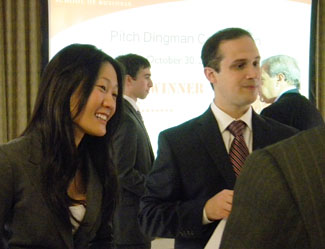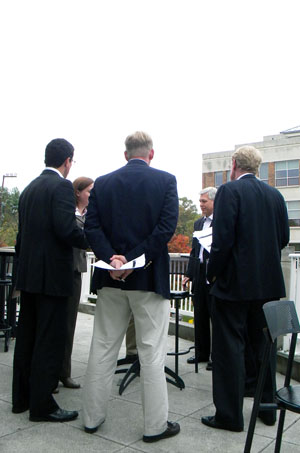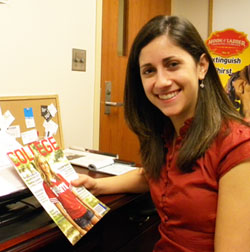 |
|||||
| Politics | Business | Schools | Justice | Health | Et Cetera |
By Emily Kimball COLLEGE PARK, Md. – Zachary Milne, 24, wants to be an entrepreneur. “It’s my first time, so we’ll see how it goes,” said Milne, an economics major at the University of Maryland, College Park. Milne is one of more than 25 students who pitched business ideas last month at the campus’ Dingman Center for Entrepreneurship in a competition that awards monthly and annual cash prizes for proposals ranging from board games to microbreweries. “All you have to do is come here with an idea, and then they support you with everything else you need,” Milne said. Since the Pitch Dingman Competition began four years ago at the center, $190,750 has been awarded to business startups, according to center records. Forty-five businesses have been launched, and 67 businesses have been financed. Many of the nation’s premier business schools -- including Babson College, Duke University, Pace University and Rice University -- offer some form of a business plan pitching competition. But Maryland’s competition, housed in the center at the Robert H. Smith School of Business, is unique in offering monthly opportunities to receive funding, along with full-service mentoring, said Alla Corey, program manager for the center. Competition judge Mitch Gorochow, managing director at RSM McGladrey Inc., said it’s a combination that works. “I’m very impressed at the critical thinking of the students, the energy and the creativity,” Gorochow said. “Frankly, that’s why I come here. I get jazzed about what I see.” How It WorksThe competition involves two major stages. First, students pitch their business ideas during short informal sessions with an entrepreneur in residence, investors and center staff. They receive feedback on how to develop their idea. When the student feels ready, he or she moves on to the second stage, which involves a formal presentation before a panel of seven judges who award up to $2,500 to business startups on a monthly basis. The center also sponsors an annual competition, which awards up to $15,000 to more firmly established student and alumni-run businesses. The informal pitching sessions occur at the center between 11 a.m. and 1 p.m. on the first three Fridays of each month. These sessions work “like a dentist’s office,” Corey said. “They come in one by one” for their 10- to 15-minute sessions. First PitchesDuring October’s first session, Corey welcomed in the month’s first fledgling entrepreneurs, offering them coffee, doughnuts and encouragement. Some wore business suits, others wore jeans. According to competition materials, center staff “evaluate the quality of your idea and presentation, not your fashion sense.” Undergraduate and graduate students are guaranteed that their ideas will not be mocked or stolen, Corey said. During the sessions, students receive feedback on how realistic their ideas are. “If a lot of people have tried the same idea and it didn’t work, we ask them to look at why it didn’t work and modify it,” Corey said. Students are encouraged to do more research and report back to the center often on their progress. Milne pitched an idea for an online hub for buying and selling products from outside vendors -- similar to eBay or Amazon. John M. LaPides, the senior entrepreneur in residence who attended Milne’s session, said it was a great idea but extremely difficult. Almost everybody wants to create a business like this, LaPides told him. The session inspired Milne to investigate other business models enabling businesses to sell their products online. Not only does pitching help students develop their communication and presentation skills, it also helps center investors and entrepreneurs in residence decide which business ideas are ready and worthy of incubation and technical services, said LaPides, who has volunteered at the center since 2001. Services available to students after pitching range from free or subsidized office space to the professional assistance of attorneys and accountants. “We're all successful entrepreneurs.” LaPides said. “We've been through it a few times, so we're here to help them get their businesses off the ground.” Asher Epstein, the center’s managing director, emphasized that the competition seeks to provide a low barrier to entry into the business world. “We offer people the opportunity to get exposed to entrepreneurship in a relatively risk-free and comforting environment,” he said. Competing for the Money
During the formal pitches on the last Friday of each month, students equipped with PowerPoint presentations, anecdotes and charismatic pleas for funding present their ideas before a panel of seven judges and dozens of audience members. Students only need to attend one informal pitch session before they qualify to participate in the monthly competition. As soon as the students feel ready, a process that can take between weeks and months, Corey schedules them a time slot. “We don’t select which ideas go forward,” Corey said. “And we never tell students they can’t compete because they have a bad idea.” The judges change every month and have no previous interaction with the presenting students. Five out of the seven judges on October’s panel were Maryland MBA alumni. All currently work as CEOs, investors or consultants. Each of the five business presentations in October were judged on how realistic the idea was, its potential for profitability, how it would target specific customers, how the product would stand up to competitors, its risk level, how passionate the presenters felt about the product and how the presenters would potentially use the $2,500 top prize money. Prize money for the monthly competition is made available through the Smith E-Fund, a combination of donor, endowment and university funds. Students are expected to itemize exactly how the prize money will be used, Corey said. “They can’t just spend it on pizza.” On Oct. 30, judges torn between two promising business presentations split the winnings between MainLine Automation and Raw Athletics. MainLine Automation founder and President Suyan Hu and CEO Nicholas Rapagnani, both MBA students, said their company would enable printing houses to convert billing statements into PDF form. “Winning the prize money was validation that it is a great idea, and it will succeed,” said Hu, whose company was awarded $1,500. Stephen Steinberg, founder and president of Raw Athletics and a senior majoring in economics, was awarded $1,000. He also won the Audience Choice Award of $250. His company already markets natural deodorizer for sports equipment, but he hopes to expand his business into natural laundry detergent for sports clothing. “The money is going to help a lot in the first step of my business plan,” Steinberg said. The InspirationThe competition originated with Epstein, who became managing director of the center six years ago. While researching successful Maryland alumni, he came across the story of Kevin Plank, chairman and CEO of Under Armour, who began his business career as a student selling Valentine’s Day roses on campus. “I realized that there were probably another half dozen, dozen or two dozen students with ambition like Kevin and with energy like Kevin, walking around campus but not getting support to be able to build their business,” Epstein said. “I wanted to create a program to help identify and support the next generation of entrepreneurs.” Shortly after founding the competition, Epstein shared the idea with Plank, who suggested creating a second annual competition, to be held each February. In 2006, they founded the Cupid’s Cup, named in honor of Plank’s first business. To qualify to compete in the annual competition, businesses started by students or alumni must have generated at least $5,000. The judging process is almost identical to the monthly competition, except that businesses are awarded up to $15,000 in prize money, drawn from a donation by Plank. Success Stories
The center boasts several examples of students who journeyed from the initial pitching session to winning thousands of dollars in prize money to establishing profitable businesses. Businesses receiving assistance from the center have generated 140 jobs and more than $9 million in revenue last fiscal year, Corey said. Most of these business have remained in-state. Amanda Nachman, 24, pitched her idea in spring 2007 for a magazine targeting college students. She was an English major in her senior year. "After I pitched, they loved the idea," Nachman said. "Hearing those words from the Dingman Center saying, 'You have something great here. Make it happen,' was really encouraging." The center assisted her with both designing the magazine and gaining enough advertising to print the first issue. By the end of 2007, Nachman had become founder and publisher of College Media Group, and thousands of issues had been distributed to area colleges. In February 2009 she competed in the Cupid’s Cup and won the $15,000 top prize, as well as the $2,500 Audience Choice Award. She used the money to create and expand the magazine's Web site. Today her magazine and Web site serve a readership of more than 120,000. The magazine is distributed at nine universities, including the University of Maryland, College Park, George Washington University, Georgetown University, American University, Towson University, Johns Hopkins University, Loyola University, University of Maryland, Baltimore County and Goucher College. “You need to find something that you really love, because it’s going to be hard,” she said. “What keeps me going every day is that I love what I do, especially the creative aspect of running this media company,” she said. Jonathan Dugan, 26, who pitched his idea for a video game sharing Web site in 2005, similarly found success with the help of the center. “When I pitched my idea, I basically had no idea what I was doing. I presented it on a scratch piece of paper,” he said. He didn’t win the monthly competition, even after weeks of working with the center and further developing his idea. One of the judges, Valerio Zanini, felt that his idea needed more polishing before it deserved prize money. “For me, personally, they told me what I needed to hear to give me the drive to keep pushing forward,” Dugan said. He returned to the center frequently to take advantage of specialized industry software and the business expertise of the entrepreneurs. Zanini noticed his drive and started working with him. Today, Zanini is partnered with Dugan as CEO of Goozex, short for “Goods exchange,” an online trading community for video games and movies. In 2007, Dugan won the Cupid’s Cup and $15,000 toward the further development of his business. “What I had was hard work and dedication,” Dugan said. “All I did was use my hard work and dedication, and we were able to piece it together into a very legitimate business.” Epstein said that in addition to working hard, beginning entrepreneurs need to start early. “Get involved and take some bumps now, because it's a heck of a lot harder when you've got a mortgage, a couple kids and a wife or husband and all sorts of other responsibilities,” he said. Milne is optimistic that he can become the center’s next success story. With the help of the center, he has significantly streamlined his business model. He now plans to focus on providing individual businesses with tools to sell their products online. He is testing out his idea on his sister-in-law’s business, Little Miss Goody Tutus, which creates ballet tutus for young girls. He said he plans on presenting his business in the monthly competition after the holiday season. “I’ve learned that being creative and combining different aspects of my experiences has led me to a business idea that is very unique and very competitive,” Milne said. “I’m just so excited about it.” Correction: An earlier version of this article incorrectly referred to the founder of Goozex. His name is Jonathan Dugan. |
||||||||||||
|
Copyright © 2009 University of Maryland Philip Merrill College of Journalism | ||||||||||||
| Politics | Business | Schools | Justice | Health | Et Cetera | |||||||


